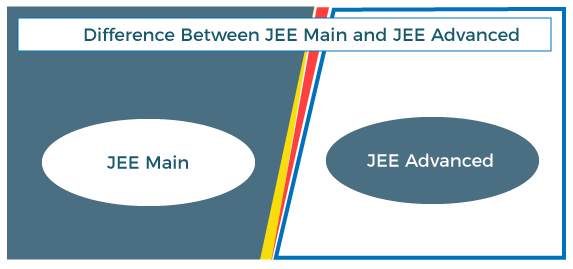Difference between JEE Main and JEE AdvancedThe Joint Entrance Examination is an entrance exam conducted for gaining admission into top engineering colleges. There is JEE-Mains, and JEE Advanced exam to assess the students. Maths and science are the most important subjects for preparing for the exams. This exam is given by the students who wish to pursue engineering as their career. You can get admission to top colleges if you clear entrance examinations like AIEEE and many more. 
JEE Mains exam is segregated into three sections, i.e., the objective-type questions, the mathematical questions, and the subjective-type questions. On the other hand, JEE Advanced is divided into 2 parts, i.e., the numerical one, and the MCQ questions one. But before that, let's take a look at some key differences between JEE Mains and JEE Advanced.
So, these are some of the major differences between JEE Mains and JEE Advanced. JEE Mains and JEE Advanced also differ in other aspects like syllabus, exam pattern, etc. Both the exams are related to each other, yet are different. There are some topics that are included in JEE Advanced but are not included in JEE Mains. Those topics are:
These are some topics that are not included in JEE Mains. Now, let us look at the paper pattern for JEE Main. As mentioned above, the number of papers conducted for JEE Mains exam is 3. In paper 1, the subjects included are Physics, Chemistry, and Maths. The paper is of three hours conducted in an online mode. Paper 1 is for 300 marks. In paper 2, the main subjects are Drawing, Maths and Aptitude. The exam is for three hours conducted in an offline mode. Paper 2 is for 400 marks. In paper 3, the students are assessed based on Aptitude, Planning, and Mathematical skills. The exam is for three hours and is conducted in an online mode. Paper 3 is also of 400 marks. On the other hand, the JEE Advanced exam (Paper 1 and Paper 2) is conducted online, with objective-type questions. Both paper 1 and paper 2 include subjects like physics, chemistry, and maths. Both the exams are for three hours. Paper 1 comes in a multiple-choice questions format, whereas Paper 2 comes in a numerical answer-type format. Well, it is interesting to note that JEE Mains exam is given by those students who wish to gain admission in BE or B.Tech courses in the NITs (National Institute of Technology) or IITs (Indian Institute of Technology). The students who apply for JEE Mains exam can also apply for JEE Advanced exam. JEE Advanced is given by the students who wish to pursue engineering courses. After the students qualify paper 1 and paper 2, they register themselves to give the AAT, i.e., Architecture Aptitude Test. The final selection of the students is made on the basis of the All India Rank, which is gained by the student in the JEE Advanced exam. In the JEE Mains exam, the questions asked are based on the application of formulas. On the other hand, in JEE Advanced, the questions asked are derivation-based. JEE Main exam is easier than the JEE Advanced exam. There is a consistent pattern in JEE Main as compared to JEE Advanced. Therefore, students are advised to prepare accordingly based on the kinds of questions asked. The students can prepare for JEE Mains and JEE Advanced together. But it is advised to prepare for JEE Advanced first as this exam is much harder than JEE Mains. So, if a student prepares for JEE Advanced, then he/ she will automatically be prepared for the JEE mains exam. The syllabus is almost similar for both exams. Now, you must be wondering how to crack these exams. Well, students can only qualify for these exams if they work hard. In order to prepare for these national-level examinations, students must start from the weak subjects. Once the weak subjects are covered, they must study those topics which will probably come in the examination. One of the major tips that the students should follow is that he/ she should clear their fundamentals by studying the NCERT thoroughly. Once you are done with the NCERT, you can study from other reference books to clear or doubts and study further. JEE Mains and JEE Advanced are important national-level examinations that the students give in order to gain admission to top colleges and universities. Students must prepare accordingly for these examinations, thereby following the preparation tips mentioned above. There are certain differences between JEE Mains and JEE Advanced regarding the syllabus, exam pattern, mode of exam, etc. Students can prepare for both exams simultaneously. Thus, both JEE Mains and JEE Advanced are important for the students who wish to apply for engineering courses in top institutions.
Next TopicDifference between
|
 For Videos Join Our Youtube Channel: Join Now
For Videos Join Our Youtube Channel: Join Now
Feedback
- Send your Feedback to [email protected]
Help Others, Please Share










